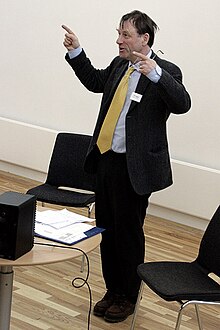Tim Ingold
 | |
| Born | 1 November 1948 |
| Nationality | British |
| Academic background | |
| Alma mater | University of Cambridge (B.A., Ph.D.) |
| Academic work | |
| Discipline | Social anthropology |
Tim Ingold FBA FRSE (born 1 November 1948)[1] is a British anthropologist, and Chair of Social Anthropology at the University of Aberdeen.
Background
He was educated at Leighton Park School in Reading, UK and his father was the world-renowned mycologist Cecil Terence Ingold.[2] He attended Churchill College, Cambridge, initially studying natural sciences but shifting to anthropology (BA in Social Anthropology 1970, PhD 1976).[1] His doctoral work was conducted with the Skolt Saami of northeastern Finland, studying their ecological adaptations, social organisation and ethnic politics. Ingold taught at the University of Helsinki (1973–74) and then the University of Manchester, becoming Professor in 1990 and Max Gluckman Professor in 1995. In 1999 he moved to the University of Aberdeen. He has four children.
Contributions
His interests are wide ranging and his scholarly approach is individualistic.[3] They include environmental perception, language, technology and skilled practice, art and architecture, creativity, theories of evolution in anthropology, human-animal relations, and ecological approaches in anthropology.
Early concern was with northern circumpolar peoples, looking comparatively at hunting, pastoralism and ranching as alternative ways in which such peoples have based a livelihood on reindeer or caribou.
In his recent work, he links the themes of environmental perception and skilled practice, replacing traditional models of genetic and cultural transmission, founded upon the alliance of neo-Darwinian biology and cognitive science, with a relational approach focusing on the growth of embodied skills of perception and action within social and environmental contexts of human development. This has taken him to examining the use of lines in culture, and the relationship between anthropology, architecture, art and design.
Recognition
- Fellow of the British Academy (1997)
- Fellow of the Royal Society of Edinburgh (2000)
Bibliography
- Ingold, T. (2015). The Life of Lines. Routledge, London.
- Ingold, T. (2013). Making: Anthropology, Archaeology, Art and Architecture. Routledge, London.
- Ingold, T. & Palsson, G. (eds.) (2013). Biosocial Becomings: Integrating Social and Biological Anthropology. Cambridge University Press, Cambridge.
- Janowski, M. & Ingold, T. (eds.) (2012). Imagining Landscapes: Past, Present and Future. Ashgate, Abingdon, UK.
- Ingold, T. (2011). Being Alive: Essays on Movement, Knowledge and Description. Routledge, London.
- Ingold, T. (2011). Redrawing Anthropology: Materials, movements, lines. Ashgate, Aldershot.
- Ingold, T. & Vergunst, J. (eds.) (2008). Ways of Walking: Ethnography and Practice on Foot. Ashgate, Aldershot.
- Ingold, T. (2007). Lines: A Brief History. Routledge, Oxon, UK.
- Hallam, E. & Ingold, T. (2007). Creativity and Cultural Improvisation. A.S.A. Monographs, vol. 44, Berg Publishers, Oxford.
- Ingold, T. (2000)The perception of the environment: essays on livelihood, dwelling and skill. London: Routledge.
- Ingold, T. (1996) Key Debates In Anthropology . Routledge.
- Ingold, T. (1986) Evolution and social life. Cambridge: Cambridge University Press.
- Ingold, T. (1986). The appropriation of nature: essays on human ecology and social relations. Manchester: Manchester University Press.
- Ingold T. (1980) Hunters, pastoralists and ranchers: reindeer economies and their transformations . Cambridge: Cambridge University Press.
- Ingold T. (1976) The Skolt Lapps today. Cambridge: Cambridge University Press.
See also
References
- ^ a b INGOLD, Prof. Timothy, Who's Who 2014, A & C Black, 2014; online edn, Oxford University Press, 2014
- ^ http://www.pontourbe.net/edicao11-entrevista/268-interview-with-tim-ingold
- ^ "in Britain, I feel that I’ve gone in one direction and, by and large, anthropology has gone in another direction. I often wonder whether I am an anthropologist any more. I think I’m forging a field that doesn’t seem to be the field that other people who call themselves anthropologists are in. I don’t worry about it too much, because I just do what I do and let other people decide whether I’m an anthropologist or not." http://www.pontourbe.net/edicao11-entrevista/268-interview-with-tim-ingold
Further reading
- Tim Ingold. On the Distinction between Evolution and History. Social Evolution & History. Vol. 1, num.1, 2002, pp. 5–24. [1]
- Tim Ingold. Towards an Ecology of Materials. Audio recording of lecture given in University College Dublin, February 2012. [2]
- Tim Ingold. Interview with Tim Ingold on October 05, 2011. In Ponto Urbe, Revista do Núcleo de Antropologia Urbana da USP, Num.11, Dec. 2012. [3]
